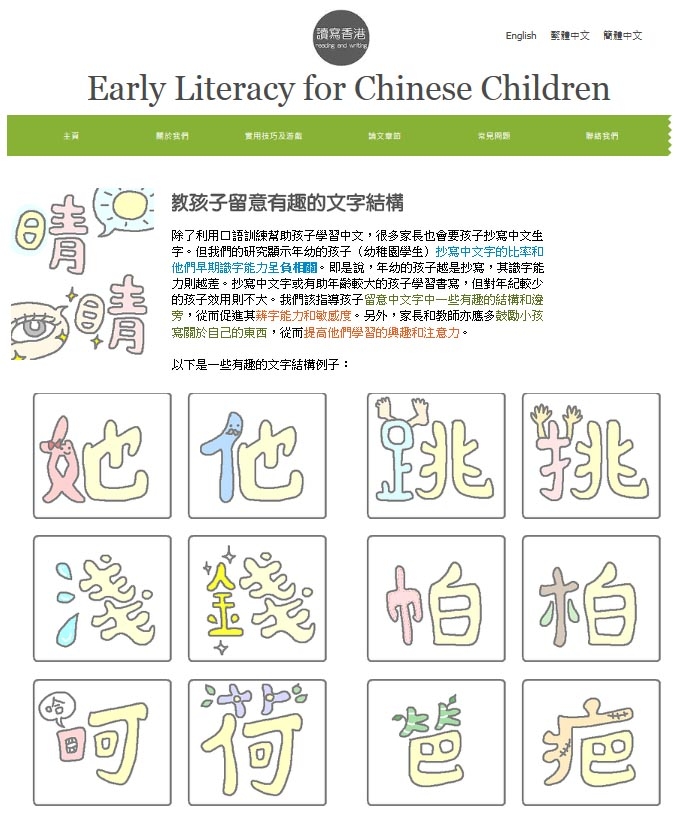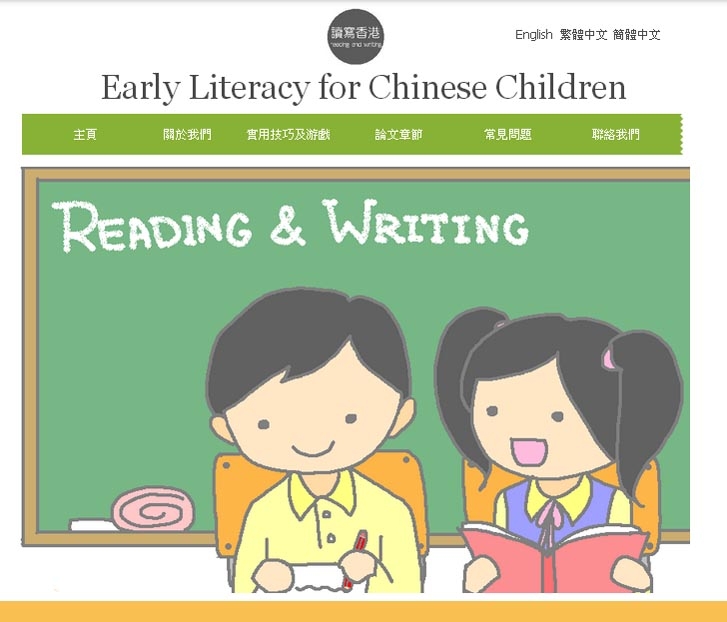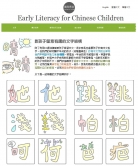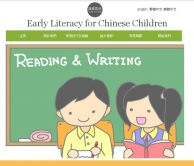CUHK
News Centre
CUHK Develops Research-based Early Literacy Website for Chinese ChildrenOffering Effective Learning Tips and Games to Facilitate Chinese Reading and Writing
To promote the knowledge of early Chinese literacy learning, the Lifespan Development Laboratory at the Department of Psychology of The Chinese University of Hong Kong (CUHK) has developed a research-based early literacy website for Chinese children, offering a range of child-oriented learning tips and suggestions for games to facilitate Chinese reading and writing skills. The website, called ‘Early literacy for Chinese children‘, is designed for the general public, especially for teachers, parents, and anyone who is interested in early Chinese learning and development. Although some games and teaching techniques are targeted for young children, those learning Chinese as a foreign or second language can also benefit from the website, since the principles of learning Chinese for such individuals are very similar.
Effective strategies based on extensive research
Literacy abilities are closely tied to children’s academic performance and social development. Although parents and teachers are eager to help children develop better literacy skills, research is important to determine what might be the ideal teaching strategies for doing so effectively and at what ages in development. Past studies conducted by the Lifespan Development Laboratory on maternal mediation of writing in kindergarten children reveal that mothers’ different teaching strategies for introducing new Chinese characters can vary in effectiveness, and some results may be surprising. For example, although rote copying of characters tends to be highly emphasized as a teaching method, this method has been shown to be less effective than other strategies focusing on stroke order and component segmentation (i.e., teaching children words by dividing them into meaningful components, e.g. semantic and phonetic radicals) for promoting writing and reading skills in young children. Copying was even found to be negatively associated with reading skills in Chinese kindergartners. The results suggest that for young children, particularly of kindergarten age (about 4-6 years), copying, by itself without additional supplemental strategies, is not particularly effective. Hence, knowing the effective strategies is essential to facilitate young children’s literacy acquisition.
Hands-on tips and fun games to make learning process easier
Over years of research, the Lifespan Development Laboratory, led by Prof. Catherine Alexandra McBRIDE, has deduced some important underlying principles of Chinese learning, and illustrated them in practical learning suggestions in the new website ‘Early literacy for Chinese children‘. A number of useful training tips as well as fun game ideas are available on the website to improve Chinese word and character learning. For example, the game ‘word building with morphemes’ in which children or adult learners are asked to make up words using morphemes can sharpen children’s lexical compounding ability, which has been shown to be strongly related to Chinese vocabulary and reading development. The website was made intriguing with many attractive illustrations. Details and other learning tips can be found in the following link: http://www.psy.cuhk.edu.hk/chineseearlyliteracy
The website also provides abundant resources of cited papers and relevant book chapters for those who are interested to learn more about the theoretical background of the Chinese learning strategies featured, making it both practical and informative for teachers, parents and the general public.
About the website and the Lifespan Development Laboratory
Development of this website was sponsored by The University Grants Committee in the form of an award of the ‘Humanities and Social Sciences Prestigious Fellowship’ to Professor Catherine McBride. With grant support from the government, and in collaboration with professors from Hong Kong University, City University of Hong Kong, and Hong Kong Institute of Education, the Lifespan Development Laboratory, led by Professor McBride, is now initiating a new study on the genetic bases of learning both Chinese and English in young Hong Kong Chinese twins. Future additions to the website may include suggestions for promoting English word reading in young Chinese children as well.
The 'Early literacy for Chinese children' website offers a range of child-oriented learning tips and games to facilitate Chinese reading and writing development.







